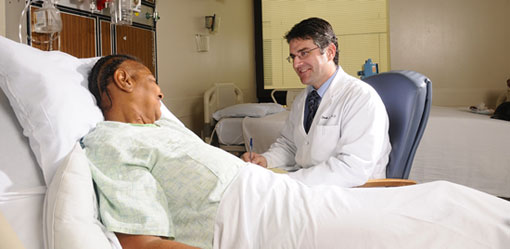 Dr. Derek DuBay with a inpatient recovering from a partial hepatectomy for a 21cm hepatocellular carcinoma.
Dr. Derek DuBay with a inpatient recovering from a partial hepatectomy for a 21cm hepatocellular carcinoma.
Program Highlights
The University of Alabama at Birmingham (UAB) Liver Transplant faculty have busy elective hepatobiliary practices. Over 150 major liver resections or extrahepatic biliary tree procedures are performed annually. The clinic has a large patient volume of hepatocellular carcinoma, cholangiocarcinoma, benign biliary disorders, and focal hepatic lesions in addition to metastatic disease. All patients with malignancies are discussed at an Interdisciplinary Liver Tumor Board consisting of physicians with clinical expertise in hepatobiliary malignancies including hepatobiliary surgeons, hepatologists, medical oncologists, radiation oncologists, interventional radiologists and liver pathologists. The Interdisciplinary Liver Tumor Board functions in a collaborative effort to best diagnose and treat patients with focal hepatic lesions, hepatocellular carcinoma, hepatic colorectal metastases, and cholangiocarcinoma.
Outcomes
A host of tertiary care treatment options are provided including surgical, interventional, chemotherapy, and radiation approaches. In many cases, multiple treatment modalities are utilized in concert to eradicate hepatic malignancies. The advanced surgical approaches include techniques to facilitate aggressive liver resections when close margins or residual liver function is a concern, such as portal vein embolization, sequential liver resection, and vascular resection/ reconstruction. Liver transplantation is also offered for tumors that meet certain requirements. Approximately 30% of the 100+ liver transplants performed annually are for hepatic malignancies. There is expertise in tumor ablation techniques, transarterial chemoembolization (TACE), and Ytrium90 intra-arterial spheres with approximately 100 patients treated with these interventions annually. UAB also offers novel methods of focal liver tumor irradiation. There are several clinical trials for developing chemotherapy regimens, and chemotherapy-radiation combination protocols. In many cases, chemotherapy and radiation protocols are initiated at UAB and continued locally for patient convenience.
Patient Centered Approach
Patients are contacted directly by the hepatobiliary physician extenders and offered a clinic appointment within a week of referral. We strive to provide excellent communication with referring physicians and compassionate patient care. Every patient is presented at the Interdisciplinary Liver Tumor Board. Health care professionals with interest and expertise in hepatic malignancies including surgeons, hepatologists, medical and radiation oncologists, liver pathologists, and diagnostic and interventional radiologists attend this weekly meeting. All radiographic studies and pathological information is reviewed before a comprehensive treatment plan is recommended. The treatment plan will be clearly communicated to both the patient and the referring physician.
Facilities
Outpatient clinics are located in the Kirklin Clinic, in close proximity to laboratory and radiology services. Liver operations are performed in the new, state-of-the-art operating complex at UAB, and interventional radiology procedures are performed in the Heart and Vascular Institute. Patients are initially cared for in the surgical intensive care unit when appropriate and then transferred to a dedicated liver surgery general ward that is staffed by a dedicated transplant and liver surgery nursing team.